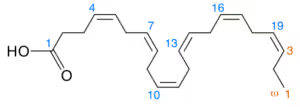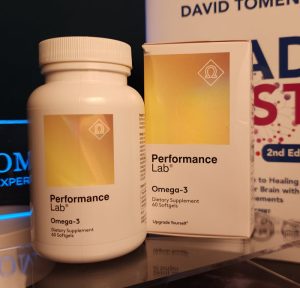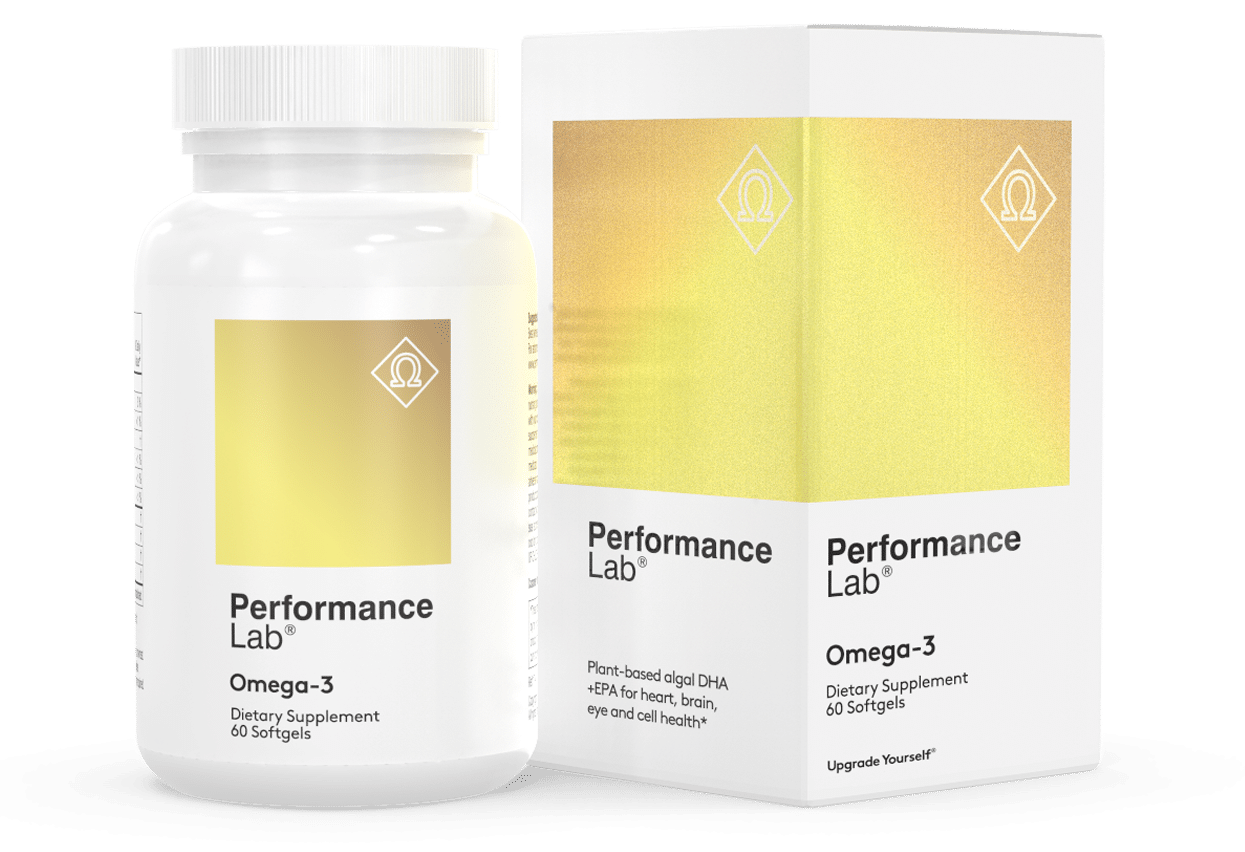Table of Contents
DHA (docosahexaenoic acid) is an omega-3 fatty acid. DHA is crucial for the healthy structure and function of your brain at all ages.
DHA impacts your brain’s signaling systems, neurotransmitters, memory, learning, focus and attention. It helps reduce and even repair cognitive decline.
The best algae-sourced DHA on the market today is Performance Lab® Omega-3 which contains 600 mg of DHA and 300 mg of EPA per dose.
The famous Framingham Heart Study followed-up with 899 men and women who were free of dementia. Subjects had a median age of 76 years. And were followed for 9.1 years for the development of dementia and Alzheimer’s Disease.
Results from the study showed 99 new cases of dementia including 71 of Alzheimer’s. The researchers concluded that those with the highest levels of DHA were “associated with a significant 47% reduction in the risk of developing all-cause dementia”.[i]
DHA helps:
- BDNF. Brain-derived neurotrophic factor (BDNF) is your brain’s growth hormone. DHA has the ability to turn on your brain’s BDNF.
- Neuroplasticity. DHA helps your brain build new neural pathways. Critical for maintaining a healthy brain. And optimizing neural signaling and cognition.
- Neuroprotection. DHA acts as an anti-inflammatory by reducing the enzyme COX-2. Inflammation is a key factor in both Alzheimer’s and Parkinson’s Disease. And in every other neurodegenerative disease.
What is DHA?
DHA (docosahexaenoic acid) is an omega-3 fatty acid. Your brain is made up of 60% fat. And much of that fat is DHA.

Your body does not make DHA on its own. So you must get it from food or a supplement. And if you are a vegan, you are at serious risk of a life-threatening DHA deficiency.
Foods that are rich in DHA include fish, fish oil, Krill and other crustaceans, and algae.
But fish do not make DHA. Fish and other marine predators get it from smaller fish and crustaceans that feed on algae. It’s algae that has the enzymes to produce DHA that we need to remain healthy.
The best algae-sourced DHA on the market today is Performance Lab® Omega-3 which contains 600 mg of DHA and 300 mg of EPA per dose.
DHA from eggs and some dairy products only supply about 20 mg of DHA per day.
DHA is essential for maintaining brain health, memory and learning functions. DHA reduces brain inflammation, stimulates new nerve cell growth, and assists in brain cell repair.
How does DHA Work in the Brain?
Your brain is composed of 60% fat. 15 – 20% of your cerebral cortex is DHA. Even the retina in your eyes is 30 – 60% DHA. Making DHA the most essential nutrient for eye and brain health.
The highest levels of DHA are found in phosphatidylserine (PS) and phosphatidylethanolamine (PE).[ii] Lower levels are found in phosphatidylcholine (PC).
PS makes up about 70% of neuron tissue mass. It helps in the storage, release and activity of neurotransmitters and receptors.
PC also makes up part of the neuron tissue mass. And helps in maintaining cell structure, fat metabolism, neuron signaling and the activation of a number of enzymes.
And PE is part of neuron cell membranes. PE is involved in cellular signaling.
PS, PE and PC are called phospholipids. Together they alter the fluidity of cell membranes. Changing the fluidity of cell membranes alters their permeability and protein activity. And influences cellular signaling.
Made up largely of DHA, these cellular membranes regulate entry into the cell, and control neuroreceptor function. Which facilitates cellular communication between, and within cells.
DHA also reduces inflammation by regulating proteins and enzymes within cells. And boosts the production of anti-inflammatory compounds that protect cells.
DHA maintains the activity of certain enzymes that control electrical signaling between cells. And it regulates the brain cell concentration of PS which is vital for cell survival.
And DHA regulates calcium oscillations, which are involved in neurotransmitter release, mitochondrial function, gene activation, oxidative stress and brain cell development and growth (BDNF).
DHA vs. EPA: What’s the Difference?
Most medical authorities and scientists agree that Omega-3 oils are important for good health. Omega-3s boost brain function, decrease inflammation, reduce the incidence of fatal heart attacks and strokes, help autoimmune diseases and improve vision.
 We have general agreement about the health benefits of Omega-3 oils. But few appreciate the difference between DHA (docosahexaeonic acid) and EPA (eico-sapentaenoic acid).
We have general agreement about the health benefits of Omega-3 oils. But few appreciate the difference between DHA (docosahexaeonic acid) and EPA (eico-sapentaenoic acid).
The ratio of DHA and EPA varies a lot in commercial Omega-3 supplements. Most have higher concentrations of EPA to DHA. Mainly because it’s cheaper to manufacture, and has less of a fishy odor.
But studies show that most of the brain health benefits of Omega-3’s are derived from DHA rather than EPA.
One study in Chicago followed 815 residents from 1993 – 2000. Study subjects were between 65 and 94 years. 131 study participants developed Alzheimer’s Disease. Those who ate fish at least once a week had a 60% less risk of Alzheimer’s compared to those who didn’t eat fish.
Researchers found that it was the intake of DHA rather than EPA that reduced the risk factor in getting Alzheimer’s. EPA made no difference whatsoever.[iii]
How Things Go Bad
From reviewing the “How does DHA Work in the Brain” section of this article, you can imagine that when things go bad with DHA – they go really bad.
Fish and marine oil supplements like krill oil are a source of DHA and EPA because they get it from algae. Plants contain another Omega-3 called alpha-linolenic acid (ALA).
Technically ALA can be converted to DHA and EPA. But most modern humans lack the ability to convert plant sources of Omega-3s into all the DHA our brain needs.
When we don’t get enough DHA, we experience:
↓ Problems with attention, learning and memory
↑ Depression, anxiety, aggression, anger, suicide risk
↑ Bipolar disorder, Alzheimer’s Disease and Schizophrenia
Not having adequate levels of DHA in the brain cause things to break down. If the inadequate intake of DHA goes on for a while, disease starts to set in. Including neurodegenerative diseases like Alzheimer’s and cancer.
DHA benefits
DHA makes up much of the gray matter in your brain. It’s an integral part of cell membranes and their function.
Your brain is 60% fat. And a large part of that is DHA.
The good news is; degenerative conditions can not only be prevented by adding DHA to your nootropic stack. It can also be reversed.
In one study, researchers worked with 485 elderly subjects with memory problems. They saw significant improvement with those taking 900 mg of DHA per day for 24 weeks compared to the control group.[iv]
In another double-blind, placebo-controlled trial, scientists worked with 49 women aged 60 – 80 years. One group received 800 mg per day of DHA for 4 months.
Researchers found those using DHA had a significant improvement in verbal fluency scores. And an improvement in memory and learning.[v]
How does DHA feel?
Chances are when you start using DHA you won’t feel it. There’s no profound stimulant feeling.
But if you suffer from chronic depression, within a few weeks you should feel the depression lift.
After supplementing with DHA for a while your cognition will be better. You’ll think clearer and quicker. Your memory and ability to learn will improve. And you’ll likely have more energy and motivation.
But it is very likely you won’t think to attribute these improvements to adding DHA to your stack. Something else will get the credit.
DHA Clinical Research
DHA is crucial for an optimally functioning brain. The goal of every neurohacker. DHA impacts your brain’s structure, signaling systems, neurotransmitters, memory, learning, focus and attention.
We have decades of clinical research verifying the importance of DHA in your nootropic stack. And several books have been written on the subject in the last couple of years. Here’s just a snippet of what’s available…
DHA Reduces Hostility and Anger
In a study with 41 university students in Japan, scientists compared a high-DHA diet (1.5 grams/day) with placebo. This was recorded over 3 months to see the effects on hostile responses.
The researchers found a 27% incidence of hostile answers in the placebo group when nothing extraordinary was going on. And hostile responses rose to 92% during final exams.
There was no increase in hostility among those taking a DHA supplement. These guys even found DHA supplementation significantly reduced hostility among university staff.[vi]
DHA Restores Neurotransmitters & Memory
As your brain ages, there is an increase in membrane rigidity. This causes changes in synapses resulting in a decrease in transmitter release. Long-term potentiation is affected which impairs the development of memories.
Several studies have shown that DHA can support healthy levels of these neurotransmitters. In one study with aged rats, researchers restored neurotransmitter release in the hippocampus. And reversed age-related memory problems.
Adding omega-3 fatty acids to the rat’s feed for 8 weeks raised concentrations of DHA in the rat’s brain. And actually reversed age-related memory impairment.[vii]
DHA Improves Attention & Learning
DHA also has an effect on neurotransmitters serotonin, norepinephrine, acetylcholine, glutamate and dopamine. Deficiencies in DHA have been shown to lower levels of dopamine. Resulting in problems with attention and learning.[viii]
DHA even plays a role in neurotransmitter receptor function. DHA affects brain cell membrane structures including neuroreceptors.[ix]
Some of these receptors communicate inside cells when stimulated by glutamate, serotonin and acetylcholine.[x] The numbers of these receptors can be increased by you, by adding DHA to your nootropic stack.
So if you are using nootropics that affect things like acetylcholine, serotonin, dopamine and serotonin in your brain. It would be wise to add DHA to your nootropic stack. And ensure you get the most bang for your investment in nootropics.
DHA Recommended Dosage
Recommended daily dosage of DHA is 1,000 mg.
Fish oil supplements vary in ratios of DHA to EPA. Salmon naturally contain more DHA than EPA. A supplement from algae may contain only DHA.
Krill oil provides both DHA and EPA. So read the labels. And whatever supplement you get, make sure you end up with at least 1,000 mg of DHA.
And recall that fish and krill do not produce DHA on their own. Marine life get their DHA from algae in the wild.
Most brands of fish oil have been proven safe, and free of mercury. And do not contain unsafe levels of PCB’s (polychlorinated biphenyls).
To further avoid the contaminants in an unrefined supplement, choose a fish oil or Omega-3 supplement made from small, oily fish like anchovies, sardines or menhaden. And check the labels carefully for purity.
Ideally, get one of a few supplements now available that are pure, refined DHA. With lower or minimal amounts of EPA.
DHA Side Effects
Fish oil capsules commonly have both DHA and EPA. Capsules with EPA are not recommended for infants or small children. Because they upset the balance between DHA and EPA during early development. This also applies to pregnant women.
Fish oil could cause minor side effects like loose stools, upset stomach and belching.
Fish oil may lower blood pressure. So if you already take a medication to lower blood pressure, make sure you talk to your doctor first.
If you’re supplement contains EPA, it could interact with blood thinners and increase bleeding. Same is true for aspirin. But this is not true of DHA. DHA-only supplements do not thin the blood.
Fish oil supplements may lower blood sugar levels. So be careful if you’re on diabetes medications.
Omega-3 fatty acids may reduce some of the side effects of cyclosporine which is used to stop rejection after an organ transplant.
Type of DHA to Buy
 DHA is available as a supplement in two forms:
DHA is available as a supplement in two forms:
- Fish oil or Omega-3 capsules. Which usually have both DHA and EPA. Most Omega-3 supplements contain higher amounts of EPA compared to DHA. But for our purposes, and to support cognitive health, we need an Omega-3 supplement containing higher amounts of DHA to EPA.
- DHA from fish oil. Some supplement manufacturers now offer capsules containing higher amounts of pure, refined DHA. And reduced amounts of EPA. Our brains require 1,000 mg DHA per day. So look for a DHA supplement that provides 1,000 mg DHA in 2-3 gelcaps.
- DHA from algae. Which may or may not contain EPA and is vegetarian friendly. Algae is the natural source of these Omega-3s in the wild and where fish and other marine life get their Omega-3s.
For as little as $49/month you can experience better cognition, memory and mood simply by using a daily DHA supplement. My favorite is Click for Performance Lab® Omega-3 which contains 600 mg of DHA and 300 mg of EPA per dose.
Performance Lab® Omega-3 contains life’s™ OMEGA algae oil which supplies natural triglyceride Omega-3s that are 70% more bioavailable than synthetic ethyl esters used in cheaper and lower quality Omega-3 fish oil supplements.
Performance Lab® Omega-3 is delivered in NutriGels which are vegan, carrageenan-free softgels. No fishy smell or aftertaste and easy on your digestive system.
Try a bottle today: Click for Performance Lab® Omega-3
Nootropics Expert Recommendation
DHA (Omega-3) 1,000 mg per day.
 I recommend using DHA as a nootropic supplement.
I recommend using DHA as a nootropic supplement.
Your body does not make DHA on its own. So you must get it from food. Or take it as a supplement.
DHA is one of the most important nootropics you can add to your stack. Your brain is 60% fat. And much of that fat is DHA.
DHA is critical for brain cell repair and regeneration (neurogenesis). And it is an integral part of neural signaling. Both between neurons as well as inside brain cells.
DHA has an effect on critical neurotransmitters and neuroreceptors. It is a powerful anti-inflammatory. And is involved in neuroplasticity.
Hundreds of studies on Omega-3s and DHA show benefits in preventing and even reversing neurodegenerative disease.
It’s best if you find a supplement that contains twice as much DHA than EPA. Such as Click for Performance Lab® Omega-3 And you can safely take 1,000 mg of DHA per day.









Join The Discussion - 228 comments
Aelxa
December 30, 2018
Hi David,
I was using Nordic Naturals Omega3 softgel getting no change in my low mood. This time when I ran out I bought their Omega3 Liquid instead and have been taking a half teaspoon supplying 250mg of DHA twice a day. In only 4 days my mood has brightened and I actually feel happy!
The question is should I continue working up to 1,000mg of DHA, or should I stay at the 500mg of DHA a day level?
Why would the liquid work better, could it be my body was not breaking down the softgel? I am over 60 and I understand stomach acid drops with age, but the difference is extremely dramatic. I appreciate your thoughts on this, thanks!
Aelxa
David Tomen
December 31, 2018
Aelxa, I think you nailed it in your comment. The aging body does not digest food or supplements as well so using a liquid would simply increase bioavailability.
If 500 mg per day of DHA is working for you then you may have found your ‘sweet spot’ for this supplement. You could try increasing your dose to 1,000 mg of DHA per day and see how you feel just as an experiment. If you feel no difference then reduce it back to 500 mg per day.
Genevieve Vayda
October 1, 2020
Hi David,
Over sixty here as well, and w/absorption issues (thinking lack of sufficient bile, for one) . . . which may or may not be reason behind more than enough daily ‘movements’.
I wonder which high DHA liquid is out there, that you would trust? Do you think it can be absorbed in the mouth? (no, right)
Thus, I wonder if you help me identify a trusted high DHA algal or small fish based oil which is not flavoried/or few un’natural’ added flavors.
Highly respect your scanning of the myriad products out there, if you could find the time.
Thanks for all that you are sharing.
David Tomen
October 1, 2020
Genevieve, you are correct that you can’t absorb this sublingually or through your mouth like some supplements. It needs to go through your digestive process.
Nature’s Way DHA is made from anchovies and I’ve used it for years: https://amzn.to/2YgaSxW. Another one I’ve tried and like is made by Carlson: https://amzn.to/2AZuQFm.
Check the bottom of the supplement facts label on each for ingredients.
John
September 15, 2018
Is it possible that DHA could make me feel worse, and it’s not right for everyone? It seems to do the exact opposite of what you would expect.
David Tomen
September 15, 2018
John, it’s very possible you got a bad supplement. This has been an ongoing controversy with Omega-3’s, fish oil, and variations like DHA.
A good portion of your brain is made of DHA. So it’s reasonable to conclude that supplemental DHA should be beneficial.
The only way to be really certain that DHA is not for you is to find and try the highest quality, purest, use-review approved DHA supplement you can find. If that doesn’t help then you know DHA is not for you.
Wim
September 1, 2018
Thanks David,
I will contact them and let you know there reply .
The “triglyceride” I have some trouble understanding that adding it in a supplements form also decreases the level in the body…
Should it not be low for cardiovascular disease reasons ?
“In regards to fasting triglycerides (TGs; risk factor for cardiovascular disease when elevated), fish oil appears to be both a potent and reliable triglyceride reducing agent for persons with hyperlipidemic (high blood TGs).”
https://examine.com/supplements/fish-oil/#summary6-1
But there they write about the “ethyl ester“ form.
Does this mean the ethyl ester form is better to lower triglycerides level?
Sorry , I see everything in mathematical way. And have trouble understanding this sum.
David Tomen
September 2, 2018
Wim, it’s not going to increase triglycerides. It’s the form factor they’re talking about, and influences how DHA gets into cells.
Wim
September 14, 2018
thanks David,
I just got a reply from Doctor’s Best:
“Thank you for contacting us about Calamari DHA 500. The mixed tocopherols are derived highly refined soy, the natural lemon flavor is derived from Lemon oil California type and Meyer lemon. You are correct as our Vegan DHA contains modified corn starch, glycerin, sunflower oil, carrageenan, sorbitol, natural flavor. Excipients are used in small amounts during the manufacturing portion with each excipient serving a purpose. We feel that the excipients used are safe to consume and stand behind our products.
Thank you for contacting Doctor’s Best. We appreciate your continued support.”
what are the bad ingredients to avoid?
David Tomen
September 15, 2018
Wim, personally I would avoid everything in that list with the exception of DHA. In my humble opinion, a DHA supplement should contain ONLY DHA and very likely a lower amount of EPA in a capsule. In this case it should be refined Calamari oil plus a capsule. There is no other practical reason for the consumer to include anything else. If you want or need “mixed tocopherols” then find the best Vitamin E supplement you can get. And use it as a separate supplement.
Tessa
September 25, 2020
I’m confused about your reply to Wim regarding Doctor’s Best response.
If he should avoid all ingredients except DHA in this product, why is it on your recommended list of DHA above?
David Tomen
September 25, 2020
Tessa, I recommend DHA because your brain is 60% fat. And most of that fat is DHA.
What I was saying to Wim is to avoid “mixed tocopherols are derived highly refined soy” and “contains modified corn starch, glycerin, sunflower oil, carrageenan, sorbitol, natural flavor”.
The DHA supplement doesn’t need anything other than DHA and possibly a lower amount of EPA. Tocopherols are supposed to be from Vitamin E and the rest of that garbage are “Excipients are used in small amounts during the manufacturing portion” which benefits the manufacturer. But does nothing for you the consumer. Because it is not necessary with better manufacturing practices.
Wim
August 28, 2018
Thanks David for the profound info,
What is the name or your link to “review of a new Omega-3 supplement made using algae” you wrote about?
What is your opinion of DHA from: (is it this one?)
Algae of Schizochytrium sp
https://www.ncbi.nlm.nih.gov/m/pubmed/11350202/?i=2&from=/11350203/related
https://www.ncbi.nlm.nih.gov/m/pubmed/12052009/?i=5&from=/11350203/related
https://www.ncbi.nlm.nih.gov/m/pubmed/28288702/
Or Calamarine what has 500mg DHA and only 50mg of EPA in one soft gel.
http://calamarine.com/why-calamarine/
As EPA is blood thinning to avoid to much blood thinning when other nootropic supplements as Vinpocentine and proanthocyanidins (pine bark extract or grape seed extract) are also taken.
What is your best choice of DHA and avoid EPA thinning effect.
Thanks
David Tomen
August 29, 2018
Wim, DHA made from algae is likely the best choice because it’s the ‘purest’ source and sustainable. DHA from squid is another good choice for similar reasons.
The ratio from Calamarine seems a good choice if you are concerned about blood thinning because of the ratio of DHA to EPA. Let us know when you find a reputable supplement manufacturer who uses Calaramine as their Omega-3 source.
I haven’t yet written a review for an Omega-3 made using algae. The product I have in mind has not yet been released. But as soon as it is I’ll put a link to it in this review.
Wim
August 29, 2018
Thanks David for the post & reply,
I found both forms : Calamarine and DHA are individual available via Doctor’s Best.
Algae:
Is delivered in triglyceride form (natural)
Examine: “Both EPA and DHA are able to reduce triglycerides and these benefits extend to other sources of DHA including algae oil”
Strange if you add extra triglyceride via this form ?
Calamarine:
Ethyl ester form and during the molecular distillation process potential contaminants are removed from the fish oil.
I don’t know who test them as you mentioned for purety.
So maybe the algae form to be more free of Mercury.
But then what about the triglyceride adding via this supplement ?
David Tomen
August 29, 2018
Wim, Doctor’s Best is normally a reliable supplement maker. But check out the label for “Doctor’s Best DHA” made from algae. It includes; modified corn starch, glycerin, sunflower oil, carrageenan, sorbitol, natural flavor among other stuff that has no place in a quality supplement. They should be ashamed of themselves.
The other one, Doctor’s Best Calamari DHA contains only ‘natural lemon flavoring, the gelatin capsule, and mixed tocopherols’. It would be nice if they detailed what the flavoring and tocopherols were sourced from. But it’s a cleaner choice by far.
And they are not adding “triglyceride” to any of these. Omega-3 fatty acids are ideally in triglyceride form. Other forms include ethyl esters or phospholipids which are not as well absorbed by your cells as triglycerides.
You would need to contain the company directly and ask them how they test their products. And ask them if they’ll give you a “certificate of analysis” for whatever batch and product number you order. Not sure if they’d give it to you.
Hami
August 9, 2018
Hello David,
From the comments above I take your meaning that a DHA rich supplement MUST have EPA as well? If so what ratio?
Here in the U.K. it’s difficult to get pure DHA only anyway. But I’ve found 2 companies. There is one other company which sells a supplement which has 2,400mg DHA and 750mg EPA and a total of 3575mg Omega 3 in a 5ml spoonful. Is this any good?
Kindest regards
Hami
David Tomen
August 9, 2018
Hami, our bodies need EPA for reasons which I won’t go into here. The problem with most Omega-3 supplements is the ratio (esp. for brain optimization) is far too much in favor of EPA.
So no, you don’t need a ‘pure’ DHA supplement. The goal is to find an Omega-3 supplement with a higher ratio of DHA/EPA. For example, I like to use Nature’s Way Mega-DHA which is 50% DHA/20% EPA. One dose of two capsules is 1,000 mg DHA and 400 mg EPA which I take daily and it works well for me long-term.
The supplement you mentioned with 2,400 mg DHA is a little high according to my research. The ratio for brain health should be OK. But I’d keep the dosage at around 2.5 mg for that supplement.
Hami
August 9, 2018
Thank you,
Kindest
Hami
Murat Likoglu
July 19, 2018
Hello David,
have a question for you, which is better?
Carlson Elite DHA Gems or Nature’s Way, EfaGold, Mega-DHA
At Nature’s Way EfaGold you still have 400 mg of EPA.
Do I have to take EPA daily?
You also have another product that is produced in Germany:
Madre Labs, DHA 700 Fish Oil, Pharmaceutical Grade
Thank you verry much,
Greeting,
Murat
David Tomen
July 19, 2018
Murat, I prefer Nature’s Way Mega-DHA because I know they test the heck out of their products before selling them. And your body does need some EPA.
I’ve no personal experience with Carlson or Madre Labs. But one reason I would NOT use the Carlson product is because it does not contain any EPA whatsoever. And we need some every day.
Pati
May 11, 2018
I’m allergic to seafood/fish so the typical DHA supplements aren’t an option for me. I current take DEVA Vegan Vitamins Vegan DHA (Algae) 200mg Vegan Softgels. However, it has carrageenan in it. I have CFS and colitis and have been told carrageenan can exacerbate these. Do you have any suggestions?
Also, I’m not sure if you have a section for CFS (I’ve read and have most of the things listed under your suggestions on motivation and energy) but what are your thoughts on D-Ribose as a nootropic?
David Tomen
May 11, 2018
Pati, continue to look for a DHA supplement made from algae. That way you avoid “the middle man”, or fish in this case, and get the benefit of these crucial fatty acids. I’ll be doing a review of a new Omega-3 supplement made using algae and avoiding carrageenan within the next month. So stay tuned …
You are correct that carrageenan has been shown to aggravate chronic inflammation. And it needs to be avoided.
I will be writing about D-Ribose later this year. It is a key component to producing adenosine triphosphate (ATP) that fuels your mitochondria. And is a powerful nootropic for energy and relief from chronic fatigue syndrome.
Nawaf
March 25, 2018
Hi David Tomen,
thank you so much
If I’m taking MEGA-DHA with spirulina or chia seed. is it consider as overdosage of DHA ? and there will be side effects?
Thank you,
David Tomen
March 26, 2018
Nawaf, it’s difficult to overdose on DHA or fatty acids. The worst that can happen is gastrointestinal problems.